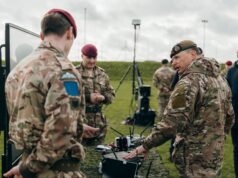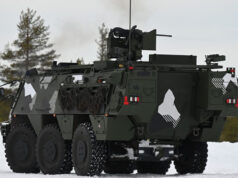The Ministry of Defence (MOD) must fully integrate artificial intelligence (AI) into its operations to remain competitive, according to a new report by the Defence Committee.
The report emphasises lessons from Ukraine, where AI has provided significant battlefield advantages, and calls for the MOD to transform into an “AI-native” organisation to harness the potential of this technology.
Emma Lewell-Buck MP, Chair of the Sub-Committee on Developing AI Capacity and Expertise in UK Defence, stressed the urgency of embracing AI:
“Artificial intelligence in defence is here to stay – the UK must move fast to avoid falling behind. Harnessing AI for defence requires not just updated technology but an updated approach.”
The report highlights that AI is already changing defence, from back-office functions to frontline operations. It warns that while MOD policy documents acknowledge AI’s transformative potential, there is a gap between rhetoric and action, with AI too often treated as a novelty rather than a core capability.
The ongoing Strategic Defence Review is identified as a key opportunity to modernise the MOD, reflecting the new reality of an AI-enabled world.
The Committee’s report finds that the UK is well-positioned to develop first-class specialisms in Defence AI, but the sector remains underdeveloped. The MOD must actively nurture the industry, identifying gaps in digital infrastructure, data management, and AI skills.
The MOD also needs to address barriers preventing smaller and non-traditional suppliers from contributing to Defence AI. Complex procurement processes and security clearance requirements are cited as significant obstacles. The report calls for greater collaboration with the tech industry, adopting its “fail fast” mindset to enable rapid, iterative development and deployment of cost-effective, software-led solutions.
To maximise effectiveness, the UK’s Defence AI systems must be interoperable with those of NATO and AUKUS allies. The report stresses the importance of shared approaches to data collection, ethical standards for autonomous technologies, and joint efforts in capacity-building.
Lewell-Buck noted:
“While the UK’s Defence AI sector may not compete with the USA and China in scale, we can offer valuable specialism and sophistication. But if we are to realise this potential, the Ministry of Defence must take a proactive approach.”
The Defence Committee criticised the MOD for failing to match its stated ambitions for AI with tangible action, calling for the department to integrate AI as a core part of its operations. The report concludes that embracing AI is not just about modernising technology but requires a cultural shift within the MOD to enable rapid change, experimentation, and innovation.














We need to get the basics right first, which includes the need to understand internal processes and their effects, the first step in BPR. That will cost money, and given the sheer number of processes, duplicated or otherwise, will take a lot of effort. If you haven’t got a handle on how you do what you do, instituting full records of process details and ownership, with service level agrements and the like, even dumb process automation is difficult to get right, nevermind AI. Using AI might be introduceable for particular challenges, such as reducing timescales of a military OODA loop or a targetting problem, but general integration throughout the Ministry to reduce costs is a long way in the future. As the article points out, a cultural shift is needed to understand that all aspects of the issue are important, not just the current flavours of the year: skills and data. Process, culture, compute, networks and cyber all need to mesh with the fashionable twosome to create an integrated capability. Only then can you liberally sprinkle the whole thing with AI.
IT’S the government getting it right that’s the problem 🙄
Is there anyone on the UK Defence Committee who isn’t a political hack, and who has had the slightest contact with the real world?
Labour
Tan Dhesi (chair): Before politics ran his own construction company that went into administration.
Calvin Bailey: before politics spent 24 years in the RAF rising to the rank of Wing Commander
Alex Baker: went straight from education to politics, also worked on the Battersea Power Regeneration Project.
Emma Lewell-Buck: was a social worker before politics
Michelle Scrogham: hard to find details, but I think it’s small-shop retail and banking
Fred Thomas: formerly Royal Marines captain (and current RM reserves)
Derick Twigg: politics all the way.
Conservative
Lincoln Jopp: Businessman and former Army colonel.
Jesse Normal, educational charity and banking.
Lib Dems
Mike Martin: Army captain and author
Ian Roome: RAF and mental health nursing
So now you know.
Doubtful. They all just sit back and throw out “what we need to do” but I never see then actually doing it. It’s like how they still maintain how much they need a standing military…that pays 18k a year. Must REALLY need it to pay literally nothing.
Terence, the UK Defence Select Committee is of course a group of Parliamentarians. Of interest is that ony 2 of the 11 members are Conservatives, yet they like to think they are the party of Defence – goodness knows why they think that. Your question really seeks to ask if they have expertise in technology and Defence.
Mr Dhesi, the Chairman, has a background in mathematics and statistics and formerly ran a construction company.
Ms Baker has a degree in Technology and worked before politics, notably on the Battersea Power Station regeneration project.
Mrs Ewell-Buck, was a social worker.
Mr Bailey has a Masters in Engineering, in the RAF for 24 years – A Pilot who rose to rank of Wg Cdr. Was awarded the US Air Medal and the MBE.
Mr Jopp was an army officer, rising to Colonel in a 21 year career. Was WIA in Sierra Leone and was awarded the MC. Awarded QCVS for service in Afghan. He also deployed on Op Shader and Op Pitting.
Mr Martin was an AR officer and served multiple times in Helmand, then was a senior executive for a global charity.
Mr Norman has a PhD and ran Education projects and spent time in banking before politics.
Ms Scroghan ran a business in retail, and an on-line business, and spent time in banking.
Mr Twigg was a Civil Servant and is a former Minister in MoD.
Mr Roome was in the RAF, then became a mental health nurse, then led the fight to save RM Chivenor when he was Mayor of Barnstaple.
Mr Thomas was an arctic warfare trained RM officer then RMR. He undertook several classified overseas operations with SFSG.
I wrote an answer to this which was thrown into purgatory and never made it out the other side. I have no idea why as it was just a list of members with what they did before going into politics, so factual. The summary from memory was 5 members had served in the Forces, 2 were purely politics straight from education, and the rest had varying degrees of non-political jobs prior to becoming full-time politicals.
Jon, I am suffering from the exact same problem. No idea why my totally factual answer is being moderated.
Starmer has just announced a ‘golden age’ of AI. Does this mean predictive text will work?
I suppose that is one way of getting ‘Intelligence’ into Government as there certainly little in the way of human intelligence currently.
But really there does seem to be a real rush to get AI into every aspect of our lives when we yet know little about it and if controls are not set in place we will have machines killing humans with out human interaction. As the biggest danger to humans are humans themselves.
I’d prefer if they used real intelligence in their decisions, I.e. actually recognising the actual threats we face, the capability gaps we have and the mass and enablers that need to be restored to the armed forces.
Not an endless loop of stupid, dumb cuts.
AI as a tool to help us is fine. The more we depend on AI the more vulnerable we are. It takes humans to define the relevance of the answers we get to the questions we pose it. We are already seeing the dumbing down of the population through inceeased dependency on smartphones doing everything for us, navigation being a prime example.
As I understand it, AI is meant to enable a computer to ‘learn’ like a human i.e. to react to new situations through inference based on ( a model of) past experience. We were fortunate then that it wasn’t around in 1940. The really difficult decisions require faith, gut instinct, courage and hope. Better be careful what you teach the machines. Perhaps we might be better off focussing on our children first.
Has no one in charge watched The Terminator?….
We had Skynet first.